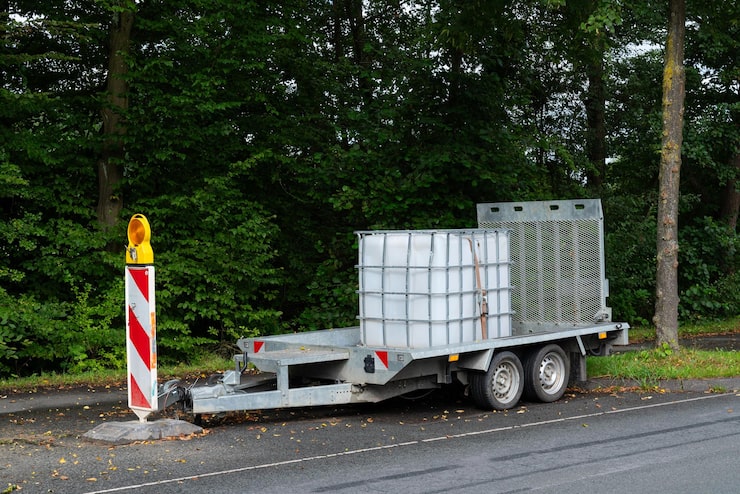Warehouses form the backbone of logistics networks, acting as hubs where goods are received, stored, and dispatched. But behind the scenes, the efficiency and safety of these facilities depend on the way trailers, drivers, and equipment are managed within the yard. Without proper oversight, yards can become crowded, unsafe, and prone to costly delays. Conducting a warehouse yard audit is one of the most effective ways to uncover risks and implement improvements before issues disrupt operations.
A warehouse yard audit provides a structured review of safety procedures, compliance standards, and trailer flow. At Zelo Express, we deliver professional warehouse yard audit services that highlight weaknesses, identify opportunities, and reduce risks. With additional solutions like yard spotting, shuttle operations, trailer safety inspections, fleet management, and gate management, we provide warehouses with comprehensive support for safer and more efficient logistics operations.
What Is a Warehouse Yard Audit
Definition and Purpose
A warehouse yard audit is a formal review process that examines the performance, compliance, and safety of a warehouse yard. It focuses on how trailers are moved and managed, how docks are scheduled, and whether staff and equipment operate according to best practices.
Why Risk Management Is Crucial
Every yard has risks, from traffic congestion to compliance failures. By carrying out a warehouse yard audit, managers can identify these risks early and prevent them from developing into costly accidents or delays.
Key Risks Addressed by Warehouse Yard Audits
Congestion and Delays
Without proper traffic flow, yards can quickly become congested. A warehouse yard audit highlights problem areas and provides recommendations to keep trailers moving smoothly.
Safety Hazards
Unsafe trailer placement, poor lighting, or inadequate signage can create dangerous environments. Audits identify these hazards and provide strategies for reducing risks.
Compliance Issues
Warehouses must comply with strict regulations, including DOT and OSHA requirements. A warehouse yard audit checks for compliance, ensuring facilities avoid fines and legal liabilities.
Equipment Failures
Trailers and yard trucks that are not properly inspected can cause breakdowns. Audits ensure trailer safety inspections and maintenance checks are being carried out.
Resource Inefficiencies
Staff or equipment that are not used effectively drive up costs. A warehouse yard audit evaluates resource allocation to ensure maximum efficiency.
How a Warehouse Yard Audit Works
Step One: Facility Review
The process begins with a full review of yard design, traffic flow, and trailer volume. This provides a baseline for evaluating efficiency and safety.
Step Two: Compliance Assessment
Auditors check whether the yard meets safety and compliance requirements, from signage and lighting to equipment standards.
Step Three: Trailer and Dock Analysis
The audit reviews trailer movements and dock utilisation, highlighting whether scheduling and positioning are optimised.
Step Four: Staff Interviews
Drivers, spotters, and yard managers provide valuable feedback about daily operations. This helps auditors understand real-world challenges.
Step Five: Reporting and Recommendations
The results are compiled into a detailed report with practical recommendations for improving efficiency and reducing risks.

Benefits of a Warehouse Yard Audit
Improved Safety
A warehouse yard audit identifies hazards before they cause accidents, protecting staff and equipment.
Reduced Costs
By eliminating inefficiencies, audits help warehouses save on labour, fuel, and maintenance expenses.
Stronger Compliance
Regular audits ensure warehouses meet regulatory requirements, reducing the risk of fines or legal action.
Better Efficiency
With optimised trailer flow and dock scheduling, warehouses operate faster and more productively.
Enhanced Supply Chain Reliability
Efficient yards directly contribute to stronger supply chain performance, keeping shipments on schedule.
Integrating Warehouse Yard Audits with Other Services
Yard Spotting Services
Spotting ensures trailers are placed correctly. By combining warehouse yard audits with yard spotting services, warehouses improve trailer positioning and reduce delays.
Shuttle Operations
Audits often reveal inefficiencies in moving trailers between yards or facilities. Shuttle operations provide the solution, ensuring seamless trailer flow.
Trailer Safety Inspections
Every audit should include equipment checks. Pairing warehouse yard audits with trailer safety inspections guarantees compliance and safe operations.
Fleet Management
By integrating audits with fleet management, warehouses reduce idle assets and improve vehicle utilisation.
Gate Management
Entry and exit delays are common risk factors. Gate management services streamline checkpoints, improving yard flow and reducing bottlenecks.
The Role of Technology in Warehouse Yard Audits
Yard Management Systems
Warehouse yard audits supported by yard management systems provide more accurate data on trailer locations, dock assignments, and turnaround times.
GPS and Telematics
Tracking trailer and driver movements ensures that audits are based on real-time information, improving recommendations.
Analytics and Predictive Insights
Audit data can be transformed into predictive models that forecast demand and highlight future risks, making warehouses more proactive.
Why Choose Zelo Express
At Zelo Express, we bring industry expertise, technology, and a practical approach to every warehouse yard audit. Our audits don’t just identify risks; they also deliver actionable solutions supported by services such as yard spotting, shuttle operations, trailer safety inspections, fleet management, and gate management.
We focus on long-term improvement, ensuring that risk management strategies become part of daily yard operations. This creates safer, more reliable, and more cost-effective warehouses.
FAQs
What is a yard safety and efficiency review?
A yard safety and efficiency review is a structured evaluation of daily operations designed to uncover risks, compliance gaps, and inefficiencies. It looks at trailer flow, dock usage, and driver coordination to ensure operations are safe, compliant, and running as smoothly as possible. The findings provide managers with actionable solutions to improve both safety and performance.
How do these reviews strengthen risk management?
They identify hazards such as poor traffic patterns, unsafe trailer placement, inadequate signage, or equipment malfunctions. Once identified, corrective measures can be put in place to reduce the chance of accidents, delays, or compliance violations. This proactive approach improves employee safety, protects assets, and ensures regulatory standards are consistently met.
Are regular assessments necessary for compliance?
While they may not always be a legal requirement, regular assessments are highly valuable for meeting DOT, OSHA, and other industry guidelines. They provide documentation that can help during inspections and protect the facility from potential fines. Beyond compliance, they establish a culture of accountability and continuous improvement in yard operations.
Can smaller warehouses also gain value from these evaluations?
Yes. Even smaller facilities face congestion, space limitations, and safety challenges. A structured review highlights these pain points and provides clear steps to optimise limited resources. This ensures that small operations not only stay compliant but also maximise their efficiency without needing large-scale investments.
Why should Zelo Express be trusted for these evaluations?
Zelo Express goes beyond simply reporting on issues. Our evaluations are combined with practical services such as shuttle coordination, spotting, fleet management, and trailer inspections. This means problems aren’t just identified—they’re resolved. With a hands-on approach backed by technology and expertise, we deliver long-term improvements that keep your operations running at their best.
Also Read: Trailer Parking Spots For Rent Near You




